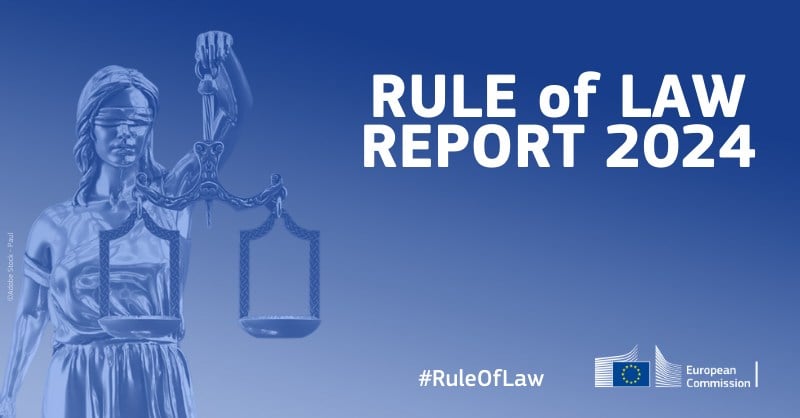A chance for integration through dialogue
On July 24, the European Commission published its fifth Rule of Law Report, which includes several candidate countries for the first time – North Macedonia, Albania, Montenegro and Serbia. This was announced as part of the measures for the gradual integration of the candidate countries. The inclusion of other candidate countries is announced for next year.
This annual Report assesses the state of the rule of law in all EU member states and aims to support candidate countries in their reform efforts. Unlike other instruments of the rule of law – the infringement procedure and Article 7 TEU on suspension, this instrument primarily uses dialogue as a method and is aimed at raising the culture of the rule of law in the member states through awareness raising.
It is no coincidence that the results of the special Eurobarometer on the rule of law are also published with the Report. This survey of public opinion in the EU, which unfortunately does not include the candidate countries, shows that its citizens highly value the EU’s core values - 89% say it is important to them that all EU member states respect the core values of the EU, including fundamental rights, the rule of law and democracy. Significantly, 72% of Europeans believe that the EU plays an important role in helping to uphold the rule of law in their country.
The rule of law is emphasized as essential for democratic values, individual rights and social and economic development, especially in the context of various social challenges and geopolitical tensions.
As in previous years, the report focuses on four main pillars:
- Judicial systems
- Anti-corruption frameworks
- Media freedom and pluralism
- Institutional issues related to checks and balances.
According to EC’s Vice President for Values and Transparency, Věra Jourová, there is progress, but there is also stagnation and even regression in some countries and some areas.
There are discrepancies between the member states, when assessed by the level of implementation of the recommendations from last year, which is the most obvious measurable criterion. The European Commission emphasizes that 68% of the recommendations from 2023 have been acted upon (with 65% in the previous year). However, this percentage gives a rather positive picture, considering that the Commission considers all grades except “no progress” and “no further progress” to be actions. Such ratings are: “some progress”, “progress”, “some further progress”, “significant progress” and “fully realized”.
Unlike the member states, no recommendations have been given for the candidate countries, which means that it will not be possible to give an assessment of their implementation next year. This significantly reduces comparability with member states, but also indicates room for improvement in “gradual integration”.
Assessment of North Macedonia
For the Macedonian authorities, and more broadly, for all relevant stakeholders, it is extremely important to recognize the messages contained in this Report, which is published only three months before the regular annual report for the country and immediately following the election of the new Government. Although great results are not possible, it is very significant in which direction the activities will take place, as well as the quality of the dialogue – internal and with the EU.
In this initial analysis, we concentrate on several key points, mainly on the more emphasized and the new elements in this report in comparison to the November 2023 Country Report.
The Report offers a series of arguments and evidence in support of the assessment that “the independence of the judiciary and its institutional capacity remain a matter of serious concern”. The Report lists the measures taken in relation to the previously assessed worrisome situations in the Judicial Council. The main caution is regarding the “dissolution” of the Judicial Council and the Council of Public Prosecutors announced by the new Government: it (rightly) causes “serious concern” as it would undermine the independence of the judiciary.
On the positive side there is the adoption of the Development Sectoral Strategy for the Judiciary and the Action Plan, the establishment of a Council for Reforms, the Action Plan for implementing the recommendations of the TAIEX Mission for the Judicial Council, as well as the measures to improve transparency undertaken by the presidents of the Supreme Court and the Judicial Council.
The pronounced trend of decreasing the efficiency of the judiciary – something that has been its strong point in recent years – is also worrying. Clearly, the chronic lack of financial and human resources is taking its toll.
There is a significant lagging behind in the implementation of the National Strategy for the fight against corruption, and the review of last year’s amendments to the Criminal Code is particularly critical. Due to the fact that high risks of corruption persist, especially in the sector of public procurement and employment in the public sector, the Report states that “There is a lack of a systematic approach in dealing with corruption to address the common denominators of risk factors.” Unfortunately, we cannot recognize new signals that would lead to the resolution of the “common denominators”, already identified in the Screening Report, such as “strong political influence in the public sector; low rate of sanctioning of corrupt behavior; inconsistent regulations; low level of implementation of integrity measures; insufficient transparency, supervision system and control mechanisms in the public sector”.
Challenges regarding the transparency of media ownership have been reiterated. The Report expresses concern about the reintroduction of state-funded media advertising, citing warnings from national stakeholders about possible disruption of media pluralism, as well as political misuse of funding. In addition, although legal guarantees for the protection of journalists have been strengthened, threats and cases of verbal and physical violence against journalists and media workers have been recorded.
Regarding the system of checks and balances, explicit criticism of the use of the accelerated procedure, as well as of the low quality of the policy-making system, which should be inclusive and evidence-based, should be taken very seriously. Civil society organizations work in a generally enabling environment, but negative findings regarding the implementation of the Strategy and the Action Plan persist, such as the non-functioning of the Council for Cooperation with Civil Society Organizations. One of the indicators in the Report is the number and handling of the so-called “leading judgments” of the European Court of Human Rights, which increased to 17 on July 1 of this year. The lack of resources and failure to act on the recommendations of the Ombudsperson are also subject to criticism.
The main challenges for the new government are how it will respond to negative trends and how it will react to “serious concerns”. It is expected to continue, i.e. to advance and encourage the positive trends, and to undertake elaborate and efficient measures to stop the negative trends. Naturally – to do it through a process of dialogue, based on arguments.
At the launch of the Report, Didier Reynders, the Commissioner for Justice, stated that five years of the EU Report publications have displayed that dialogue can aid to achieve significant progress. Therefore, he expressed confidence that the Report will continue to be a forum for initiating debates at the national level and will aid to encourage national reform agendas.
It remains for us to express the same assurance about the “newcomers” in the Report – the candidate countries.






